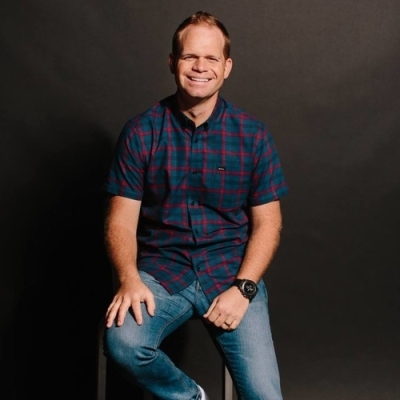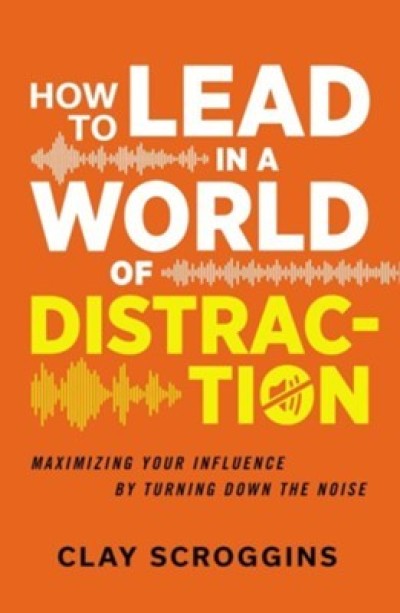Pastor Clay Scroggins: 4 ways to build emotional, spiritual health amid distraction 'epidemic'

Distractions are everywhere: From smartphones to constant internet access, the opportunity to tune out the world around us knows no bounds. Like never before, society’s 24/7 consumer culture and obsession with busyness allows us to numb emotions and avoid inconveniences for the promise of something better.
But according to Buckhead Church Pastor Clay Scroggins, distractions aren't innocuous — in fact, they're a problem of epidemic proportions.
“Distractions get in the way of your ability to grow as a person and a leader,” he told The Christian Post. “They pull you away from things that truly matter. We use distractions because we have emotions and feelings inside of us that are coming from uncomfortable places; places of brokenness and pain. We’re losing the ability to deal with these emotions because we’re so used to turning up distractions and avoiding them.”
“We’re the most stressed, depressed, anxious, and most medicated society in history, and it’s because we can’t deal with the emotions inside of us because we’re so used to distracting ourselves from them. All of us are prone to it, and it’s a drug. It’s what we use to cope and avoid and distract and mask anything we don’t want.”
Scroggins speaks from personal experience. The leader of a 9,000-member Atlanta megachurch, husband, and father of five, he was dismayed to discover his own tendency to both willfully and subconsciously choose distractions over engaging with those around him.
“I realized how rarely I pressed pause to discover and listen; how often I turn up the noise in my life,” he admitted. “Loneliness, shame, guilt — we need to deal with these negative emotions, or we won’t become better people or trend toward emotional health, which is what God wants for everyone because He created us as emotional beings.”

Social media, for example, is “wreaking havoc” on our lives, the pastor warned. He pointed out that Instagram recently changed its algorithm to dictate the order of the posts that users see when they're scrolling through their feed.
“Now, it’s easier than ever to scroll for hours,” he said. “Instagram has created an opportunity for you to scroll endlessly, and that’s how most of us are spending our lives.”
But technology isn’t the root of the problem, he clarified. “Social media is just the scapegoat. Our penchant for distraction has always been there; it’s just magnified now because of technology. The idea of masking emotions that I don’t want to feel has always been present for humanity. For example, drugs and alcohol abuse are the worst forms of distraction, but what I’m learning is now, we have so many more forms of distraction thanks to technology.”
Scroggins’ latest book, How to Lead in a World of Distraction: Four Simple Habits for Turning Down the Noise, helps readers identify what’s pulling them away from what they actually value and offers four spiritual disciplines and practices to help maximize their influence by focusing on emotional and spiritual health.

“I’m basically writing about what I, in my own life, need to do,” he said. “I’m very uncomfortable telling someone how to live their life, but I feel comfortable writing, here’s what I’m doing to address this issue.”
The first way to “turn down the noise,” the pastor said, is by finding simplicity. “Simplicity is a spiritual discipline of eliminating clutter and distraction so that I can focus on what’s most important,” he explained
Second, it’s important to “speak to yourself and remind yourself of truth,” Scroggins stressed.
“An emotionally strong person is able to self-narrate their life, and this is biblical,” he said, citing Psalm 43:5, where David says, "Why, my soul, are you downcast? Why so disturbed within me? Put your hope in God, for I will yet praise him, my Savior and my God."
Third, the pastor recommended sitting in solitude as a form of prayer and conversation with God.
“The whole idea of that practice is that you would have a place and space and time on a regular basis where you’re turning down the noise low enough to be ruthlessly curious of your emotions,” he said. “Have a conversation with God and ask, 'What do I want? What do I need? What do I need to surrender?'"
Finally, Scroggins encouraged readers to “press pause.”
“Our culture worships busyness, but it’s important to practice the discipline of fasting and Sabbath,” he said. “Press pause to discover and listen, to rest in what we know to be true about God.”
Implementing these practices in his own life, Scroggins said, was “lifechanging.”
“In our culture, there’s such a propensity towards loneliness and it’s a common issue we’re all trying to mask, but none of us ever say it out loud,” he reflected. “That was one practical area where I started to see the grace of God in a tremendous way; that He’s a loving, Heavenly Father who is saying, ‘Hey, I want to enter into your loneliness with you. You don’t have to mask it. Let’s deal with it together.’”
“The truth of what Jesus won for us on the cross is, He experienced extreme loneliness so we could live a life where we never have to be alone. Learning to speak to my emotions and reminding myself that I might be lonely or by myself, but I'm not alone.”
The pastor said he hopes his book provides encouragement to those tempted by the distractions around them and helps readers understand that their emotional and spiritual growth depends on some countercultural spiritual disciplines.
“As a society, we need to learn to silence the noise around us, even when it’s painful,” he emphasized. “The beauty of it is that God says, ‘I'm going to enter into this pain with you if you would invite me, but it requires turning down the noise.’”



























